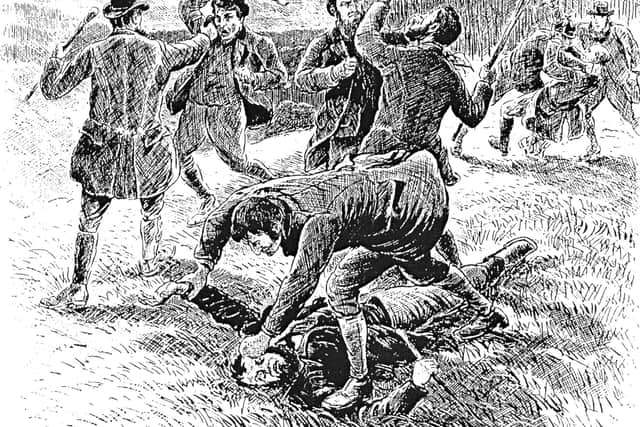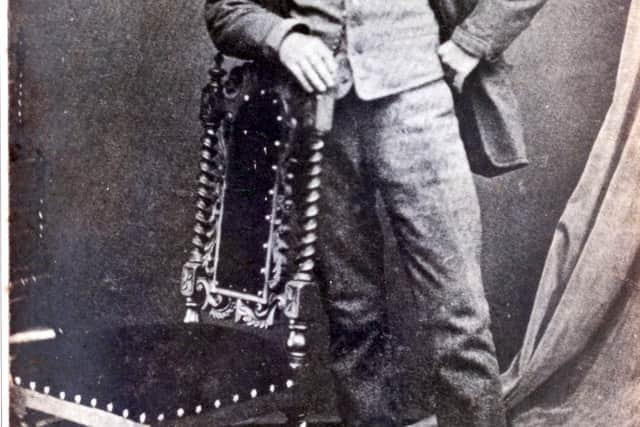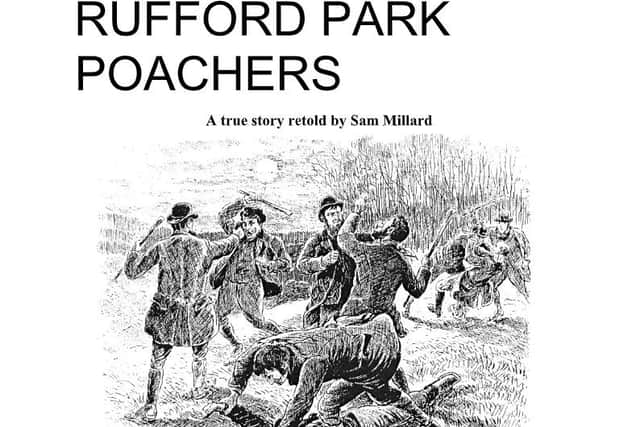Historian highlights famous case of Rufford Park poachers - and wants to find any descendents
This article contains affiliate links. We may earn a small commission on items purchased through this article, but that does not affect our editorial judgement.
and live on Freeview channel 276
The Rufford Park Poachers is the tale of an historic clash between gamekeepers and local workers on the hunt for food.
And Sam Millard, aged 75, is encouraging people to find out more about the incident, which saw four men sentenced to several years hard labour in Bermuda.
Advertisement
Hide AdAdvertisement
Hide AdInspired by a folk song The Rufford Park Poachers, Sam set off on a journey of discovery several years ago, delving into archives and court records to establish both sides of the brawl, which was reported in newspapers across the country.
Since then, he was written a booklet about his findings and, for the last four years, has given talks about the tale to community groups and at folk festivals.
Now, Sam is encouraging people to find out if their family history intertwines with the ‘heroes and villains’ tale, as the 170th anniversary of the skirmish is on October 13.
He said: “There are, without doubt, many readers who are unaware of this slice of their family history.
Advertisement
Hide AdAdvertisement
Hide Ad“The characters in this story, on both sides, were people trying to look after their families in the best way they could, even with the harsh penalties that could follow.


“I gathered together all of the names of the participants from both sides of the incident and detail of the subsequent arrests and trials.
“No doubt many of the descendants of those involved still live in the Mansfield, Ashfield area.”
Sam’s booklet on the Rufford Park Poachers is available to buy at Mansfield Museum, as well as via Ebay.
Advertisement
Hide AdAdvertisement
Hide AdIt contains the names of men involved in the fight, as well as witnesses at the trial.


Sam said: “I have researched this story in detail and have presented it to more than 40 local and national groups, regional TV and radio over the course of the past four years.
“Recently I did this as a Zoom presentation that had viewers in Australia and Canada.
“Back in 1851 it featured in newspapers throughout the land, from Tralee to Maidstone, from Truro to John O’Groats.”


‘Transported beyond the seas’
Advertisement
Hide AdAdvertisement
Hide AdSam’s research shows more than 30 men from Mansfield and Sutton set out to catch wild rabbits and other game to feed their families.
They were facing starvation as the framework knitting industry – the mainstay of the area at the time – was in terminal decline.
Recent law changes had made such hunting illegal on private land and landowner, the Earl of Scarborough, employed a team of gamekeepers to enforce the new laws.
The gamekeepers lay in wait for the men, and following a confrontation, a brawl broke out in which stones, flails and fists were used by both sides, leaving many injured and a gamekeeper fatally wounded.
Advertisement
Hide AdAdvertisement
Hide AdOver the following weeks, suspects were rounded up and brought before magistrates in Mansfield.


Many were released due to lack of evidence, but six stood trial the following year in Nottingham.
Charged with manslaughter, poaching and affray, four of the men were found guilty and sentenced to be ‘transported beyond the seas.’
They were released on licence after several years hard labour in Bermuda.
‘Heroes or villains’
Advertisement
Hide AdAdvertisement
Hide AdSam’s interest in the tale was sparked by a folk song recounting the fateful night.
A retired primary school headteacher, who has lived and worked in Nottinghamshire for more than 40 years, Sam lives near Rufford Park and is now in demand as a speaker on the historic fight, as well as giving walking tours of Newark and Retford.
Sam said: “I’ve always had an interest in local history and in folk music, but had never done any research of this type.
“I found a reference to the story in the appendix of a book of folk songs produced in 1971. This referred to a document in Mansfield Museum.
Advertisement
Hide AdAdvertisement
Hide Ad“When contacted they kindly gave me a copy. This is a broadsheet that outlines the court case that followed the incident.
“Further research in libraries and on the internet gave more snippets of information and it became clear this had been a major news story at the time.
“I looked at archives and articles to get details of both sides of the story – both sets of men were doing what they had to do to feed and protect their families.
“It’s impossible to say which side were the heroes or villains.
Advertisement
Hide AdAdvertisement
Hide Ad“I found the whole thing very interesting. I’d never done this kind of research before, but it was just something that gripped me.
“Once I’d started researching it, it was a case of ‘what do I do with all this information now?’ which is where the booklet and the talks came in.”
Now, Sam is hoping the path taken by the men may some day be named to commemorate the clash.
He said: “There are various marked pathways that lead from Mansfield into the Sherwood Forest. Many are named.
Advertisement
Hide AdAdvertisement
Hide Ad“The route that follows that taken by the poachers hasn’t been complete for some time – Rufford Colliery meant that it had to divert.
“This land is now being restored and, on completion, it would be good to see this section of local history marked by calling it The Poacher’s Way.
“For now though, I’m just hoping people will find it interesting that their family tree could include someone who was involved.”
